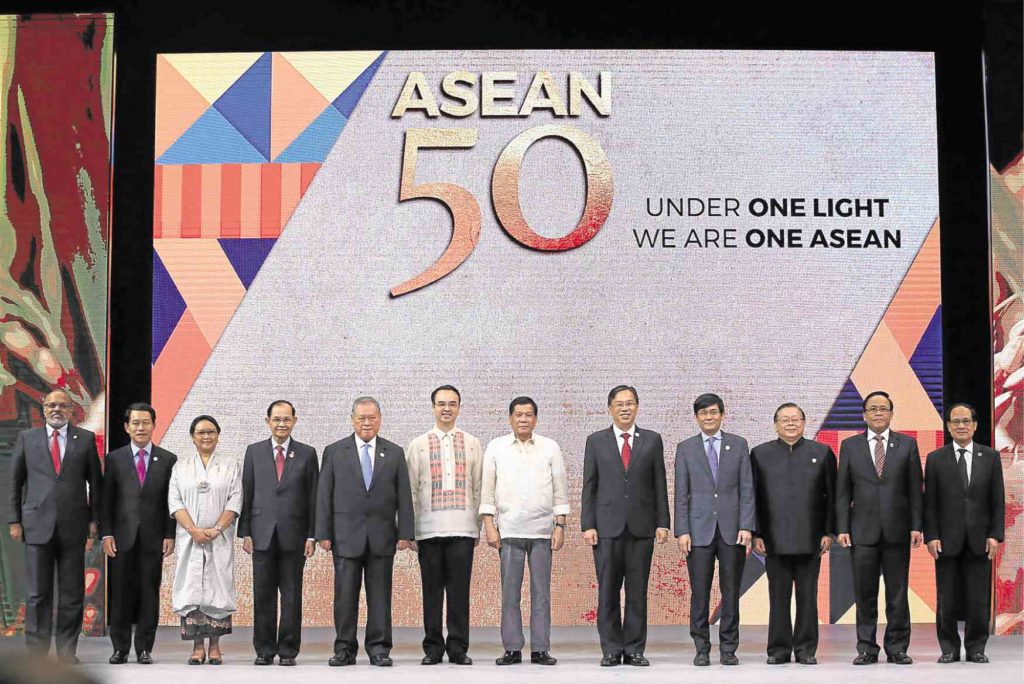
ASEAN’S 50TH President Duterte (sixth from right) and Foreign Secretary Alan Peter Cayetano (sixth from left) join Asean foreign ministers and their representatives for a family photo during the celebration of the 50th anniversary of the Association of Southeast Asian Nations at the Philippine International Convention Center in Pasay City. —MARIANNE BERMUDEZ
President Rodrigo Duterte on Tuesday called an American-led free trade deal a dream that had vanished and instead endorsed a China-backed arrangement to supplant it.
“We must take a serious look at economic integration,” Mr. Duterte told foreign ministers from the Association of Southeast Asian Nations (Asean) and its partners in celebrations marking the regional bloc’s 50th anniversary.
“Asean has a bigger stake than any other part of the world in standing up against protectionism and securing the rules of the game in the international trade,” said Mr. Duterte, who chairs Asean this year.
He said the Regional Comprehensive Economic Partnership (RCEP), a massive free trade agreement involving the 10-member Asean and China, South Korea, Japan, India, Australia and New Zealand, would provide the impetus for moves to block protectionism and improve trade.
“Negotiations should conclude swiftly as decided by RCEP leaders in 2016. I was reminded that the Trans-Pacific, it was a dream that was no longer there,” he said.
US President Donald Trump pulled out of the Trans-Pacific Partnership (TPP), a trade deal with Pacific Rim countries pushed by his predecessor Barack Obama, which he called a “job killer.”
The TPP was widely seen as a deal that would create an economic bloc worthy of rivaling China’s might.
Mr. Duterte earlier praised Trump’s decision to pull the United States out of the TPP, saying the trade deal would not benefit the region.
The President also said Asean must do more in its pursuit of lasting peace and security, continued cultural development and economic prosperity.
“Prosperity should not be the right of just a chosen few. It must be a blessing enjoyed by all,” Mr. Duterte said.
He called on the private sector to step up its efforts to spur regional growth, and sought more support for small businesses.
“Public-private partnership must be harnessed fully to lift our peoples from poverty. Indeed, the Asean Business Advisory Council’s Alliance for Prosperity for All is showing how the inclusive business model can help achieve growth [for] our [micro and small and medium enterprises] and our peoples in the grassroots,” he said.
Mr. Duterte also paid tribute to Asean’s founding fathers and to the bloc’s achievements and its resiliency, even as it faces new challenges.
Until recently, China and the United States were both pushing sweeping free trade deals that excluded each other.
But shortly after taking office in January, Trump withdrew from the TPP, delivering a hammer blow to the 11 other nations who spent seven years negotiating what was billed as the world’s largest trade deal.
Before Trump’s withdrawal, the TPP would have covered 40 percent of the global economy.
It went further than most existing free trade pacts, with labor laws, environmental protections and intellectual property rights touted by backers as a new gold standard for global trade.
The deal, which excluded China, was also seen as a way to counter Beijing’s regional economic dominance.
In response to the TPP, Beijing has been pushing the RCEP, a more modest deal that prescribes lower and more limited regulatory standards. —WITH A REPORT FROM AFP

